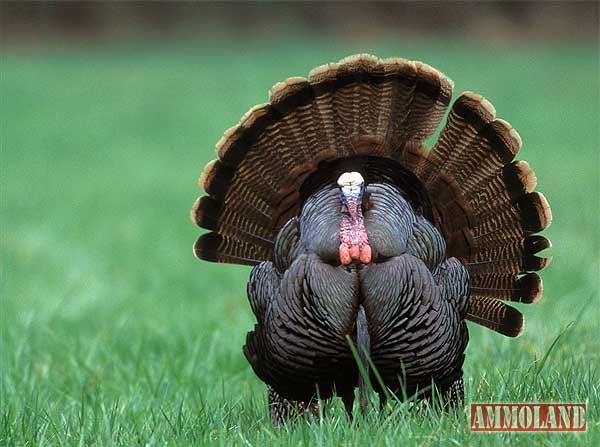

SOCIAL CIRCLE, Ga. –-(Ammoland.com)- Springtime hunters are eagerly preparing for the opening of turkey hunting season in Georgia.
The highly anticipated day is Saturday, Mar. 22 and the Georgia Department of Natural Resources’ Wildlife Resources Division expects that the 2014 season should be a good one.
“One of the best areas of the state will be the coastal plain, thanks to reproduction numbers that were stable in 2012, and then saw an increase this past year,” says Kevin Lowrey, Wildlife Resources Division wild turkey project coordinator.
“However, due to both low reproduction numbers and a good harvest of gobblers for the past two years, 2014 might be a challenging year for hunters, especially in the piedmont and ridge and valley.”
Georgia’s current turkey population is estimated at 335,000 birds and turkey hunters in this state are privileged with one of the longest turkey seasons nationwide. With a bag limit of three gobblers per season, hunters have from Mar. 22 through May 15, 2014 to harvest their bird(s). With many pursuing wild turkeys on private land, hunters are reminded to always obtain landowner permission before hunting.
A new video, featuring Lowrey, provides forecast information about the 2014 Georgia turkey hunting season. Video available at www.youtube.com/GeorgiaWildlife.
)
WMA Hunting Opportunities
Georgia offers excellent turkey hunting on several wildlife management areas. Through the WMA system, resident hunters have access to nearly one million acres of prime hunting land for just $19 a year. Detailed below are some of the WMAs with the highest 2013 turkey hunting season success rates in the state:
- Northwest: Berry College and Paulding Forest WMAs
- Northeast: Lake Russell and Dawson Forest WMAs
- West Central: Clybel and Rum Creek WMAs
- East Central: Di-Lane and Tuckahoe WMAs
- Southeast: Griffin Ridge and Sansavilla WMAs
- Middle: Moody Forest and Horse Creek WMAs
- Southwest: River Creek and Chickasawhatchee WMAs
A WMA license is required for any person 16 years or older who does not possess a valid honorary, sportsman or lifetime license when hunting wild turkey on a WMA or public fishing area. In addition, a valid hunting license and a big game license are required. Legal firearms and archery equipment for hunting wild turkey are shotguns (loaded with No. 2 or smaller shot), any muzzleloading firearm, longbow, crossbow or compound bow.
Where can you get a license? Buy it online, find a list of retail license vendors at www.georgiawildlife.com/licenses-permits-passes or buy it by phone at 1-800-366-2661.
Conservation of the Wild Turkey in Georgia
The restoration of the wild turkey is one of Georgia’s great conservation success stories. Currently, the bird population hovers around 335,000 statewide, but as recently as 1973, the wild turkey population was as low as 17,000. Intensive restoration efforts, such as the restocking of wild birds and establishment of biologically sound hunting seasons facilitated the recovery of wild turkeys in every county. This successful effort resulted from cooperative partnerships between private landowners, hunters, conservation organizations like the National Wild Turkey Federation and the Wildlife Resources Division.
The Georgia Chapter of the National Wild Turkey Federation has donated more than $3,612,478 since 1985 on projects that benefit wild turkey and other wildlife. The NWTF works cooperatively in partnership with the Wildlife Resources Division and other land management agencies with the focus on habitat enhancement, hunter access, wild turkey research and education. The NWTF has an exciting new initiative called “Save the Habitat, Save the Hunt” focused on habitat management, hunter access and hunter recruitment.
“Hunters should know that each time they purchase a license or equipment used to turkey hunt, such as shotguns, ammunition and others, that they are part of this greater conservation effort for wildlife in Georgia,” said Lowrey. “Through the Wildlife Restoration Program, a portion of the money spent comes back to states and is put back into on-the-ground type efforts such as habitat management and species research and management.”
For more hunting information, visit www.georgiawildlife.com/hunting/regulations .
